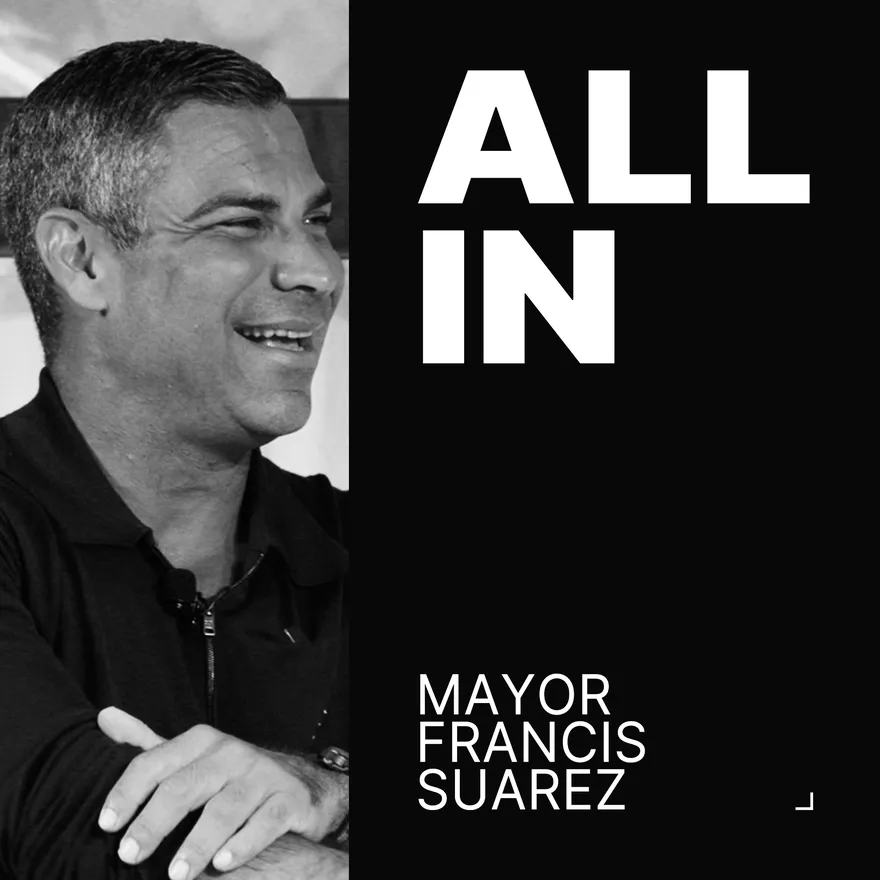Miami Mayor Francis Suarez: The Recipe for Creating America's Happiest City | All-In Live from Miami
In this episode of All-In, Miami Mayor Francis Suarez discusses his city's strategies for addressing urban challenges. The conversation covers Miami's approach to homelessness, which combines direct housing assistance and family reunification programs, resulting in the lowest number of unsheltered individuals in 11 years. Suarez explains how the city handles the complexities of mental health and substance abuse issues among the homeless population.
The discussion also examines Miami's economic growth and innovative solutions to urban development. Suarez details how Miami maintains low tax rates while expanding government operations, and outlines the city's partnerships with companies like Boring Company for transportation solutions. The mayor compares Miami's regulatory approach with other major cities, highlighting differences in tax policies and attitudes toward business development.

This is a preview of the Shortform summary of the Jun 3, 2025 episode of the All-In with Chamath, Jason, Sacks & Friedberg
Sign up for Shortform to access the whole episode summary along with additional materials like counterarguments and context.
1-Page Summary
Homelessness and Urban Social Issues in Miami
Miami has achieved remarkable success in addressing homelessness, reaching an 11-year low with only 546 unsheltered individuals counted in January. Rather than building new shelters, the city implements innovative strategies like direct home rentals with wraparound services and family reunification programs. Mayor Suarez hosts an annual Mayor's Ball to raise funds for achieving "functional zero" homelessness.
However, the challenge is complex, with Mayor Suarez noting that over 80% of unsheltered homeless individuals struggle with mental health issues or substance abuse. The crisis is further complicated by the rise of highly addictive drugs like [restricted term] and [restricted term].
Economic Growth, Innovation, and Policy Approaches in Miami
Under Mayor Suarez's leadership, Miami has experienced substantial growth while maintaining historically low tax rates. The city government has grown 140% in nine years, expanding from a $500 million to a $1.5 billion operation. The business-friendly environment has attracted major organizations, including FC Barcelona relocating its headquarters from New York to Miami.
The city is embracing innovative solutions to urban challenges. Mayor Suarez describes partnerships with the Boring Company and eVTOL providers to address transportation issues. Additionally, Miami is implementing AI technology to streamline governmental processes, working toward instant permitting and automated zoning decisions.
Comparison of Miami's Strategies to Other Cities' Approaches
Miami's approach stands in stark contrast to cities like New York and San Francisco, according to Mayor Suarez. While other cities opt for higher taxes and stricter regulations, Miami maintains low taxes and welcomes innovation. Suarez points to specific examples, such as New York's rejection of Amazon HQ2, to illustrate how other cities' policies can drive away business and innovation.
The city has successfully navigated regulatory challenges through creative solutions. Suarez proposes using sunset clauses to phase out outdated regulations and implementing technology-driven permit processing. This approach has helped Miami attract major projects like the Inter Miami stadium and secure its position as the FIFA World Cup headquarters for 2026.
1-Page Summary
Additional Materials
Counterarguments
- While Miami's homelessness rates are at an 11-year low, it's important to consider the quality and sustainability of housing solutions like direct home rentals and family reunification programs.
- The success in reducing homelessness numbers may not fully address the root causes of homelessness, such as affordable housing shortages, income inequality, and access to comprehensive healthcare.
- The claim of over 80% of unsheltered homeless individuals struggling with mental health issues or substance abuse could be scrutinized for stigmatizing this population and oversimplifying the complexity of homelessness.
- Economic growth and expansion of the city government's budget do not necessarily equate to equitable distribution of wealth or benefits for all residents, particularly those in lower-income brackets.
- Attracting major organizations and maintaining low tax rates might not capture the full picture of economic health, as it could lead to gentrification and displacement of long-term residents.
- The partnership with the Boring Company and eVTOL providers assumes that these technologies will be effective and accessible solutions for transportation issues, which may not be the case for all city residents.
- The implementation of AI technology in governmental processes raises concerns about transparency, accountability, and potential biases in automated decision-making.
- Comparing Miami's strategies to those of other cities like New York and San Francisco may oversimplify the challenges and solutions unique to each urban context.
- The use of sunset clauses to phase out regulations could lead to regulatory instability, which might affect long-term planning for businesses and residents.
- Technology-driven permit processing could potentially overlook important environmental, social, and urban planning considerations in the pursuit of efficiency.
- Hosting major events like the FIFA World Cup can bring economic benefits but also has the potential for significant costs, disruption to local communities, and long-term impacts on the city's infrastructure and resources.
Actionables
- You can support local homelessness initiatives by volunteering with organizations that focus on housing solutions. By dedicating a few hours each week to assist with administrative tasks or outreach programs, you contribute to the efforts that have proven successful in cities like Miami. For example, find a local charity that works on direct home rentals or family reunification and offer your time or skills to help them operate more efficiently.
- Consider investing in companies that develop AI technology for streamlining governmental processes. By choosing stocks or funds that include these companies, you're not only potentially growing your personal wealth but also supporting the kind of innovation that can lead to more effective governance, as seen in Miami's use of AI.
- Advocate for the adoption of sunset clauses in your community by writing to local representatives. Explain the benefits of eliminating outdated regulations to make room for innovative solutions. You could cite the success of Miami's technology-driven permit processing as an example of how such policies can attract investment and improve city infrastructure.
Get access to the context and additional materials
Homelessness and Urban Social Issues in Miami
Miami combats homelessness with innovative strategies while facing challenges related to mental illness and substance abuse.
Miami Addresses Homelessness Through Innovative Strategies and Collaboration
The city has reached an 11-year low in unsheltered homelessness, counting 546 individuals in the latest January census.
11-year Low in Unsheltered Homelessness: Emphasis on Shelter, Services, Family Reunification
Through efforts like family reunification programs and the provision of homes with wraparound services, Miami avoids the delays of building new shelters by renting homes directly for those in need.
Mayor Suarez's Annual Ball Raises Funds to End Homelessness
Mayor Suarez hosts an annual Mayor's Ball aimed at raising funds to achieve a "functional zero" in homelessness, aligning with the vision of ending homelessness in Miami completely.
Miami's Homeless Face Mental Illness and Substance Abuse, Needing a Comprehensive, Compassionate Approach
Mayor Suarez indicates that over 80% of the unsheltered homeless in the city struggle with mental health issues or substance abuse, underscoring the need for a comprehensive strategy.
Addictive Drugs Like [restricted term] and [r ...
Here’s what you’ll find in our full summary
Homelessness and Urban Social Issues in Miami
Additional Materials
Counterarguments
- While the reduction in unsheltered homelessness is commendable, it may not fully capture the scope of the issue, as many individuals experiencing homelessness may not be counted in official censuses due to their transient nature or reluctance to engage with authorities.
- Providing homes with wraparound services is a positive step, but it may not be sustainable or scalable without continuous funding and community support, and it may not address the root causes of homelessness.
- Fundraising events like the Mayor's Ball can raise significant funds, but they may also divert attention from systemic solutions and rely on the fluctuating generosity of donors rather than stable, long-term funding mechanisms.
- The claim that over 80% of unsheltered homeless individuals struggle with mental health issues or substance abuse could stigmatize this population if not presented with context and care, potentially leading to misconceptions about the causes of homelessness.
- While drugs like [restricted term] and [restricted term] are serious concer ...
Actionables
- You can support local businesses that employ or assist the homeless population, creating a positive economic loop that benefits vulnerable community members. By choosing to spend your money at establishments that have a direct impact on homelessness, you're not only contributing to the local economy but also supporting a business model that provides job opportunities and training for those who are unsheltered. For example, look for cafes or stores that partner with shelters or vocational programs for the homeless.
- Consider volunteering your time with organizations that offer mentorship or skill-building workshops for individuals struggling with homelessness. By sharing your knowledge in areas such as basic finance, job interview preparation, or even general life skills, you can help empower those affected to regain stability in their lives. This could be as simple as offering to help with resume writing at a local community center or teaching a weekly class on budget management.
- Advocate for policies that address the root causes of homelessness by writing to your local representatives. ...
Get access to the context and additional materials
Economic Growth, Innovation, and Policy Approaches in Miami
In a recent discussion, Francis Suarez, Mayor of Miami, shares insights into the mechanisms driving the city's economic boom, innovation acceleration, and the implementation of progressive policy approaches to nurture further growth.
Miami's Economic Success: Business-Friendly, Low Taxes, Public Safety Focus
Miami's local government has grown 140% in nine years, concurrent with historic tax lows, business influx, and an emphasis on public safety.
City's Local Government Grows 140% In Nine Years With Low Taxes
Mayor Suarez touts his administrations’ decision to keep taxes at their lowest levels, which is met with a substantial increase in the size of Miami's government. Despite historically low rates of taxation, the city has seen a 200% growth from a $500 million government to a $1.5 billion government, challenging general expectations that lower taxes necessarily result in smaller government.
Businesses, Talent, and Investment: Fc Barcelona Relocates Headquarters From New York to Miami
There's a robust economic reality in Miami exhibited by the arrival of talent and businesses; for instance, FC Barcelona relocated their headquarters from New York to Miami. This is a testament to the city's inviting business climate. Suarez correlates the economic prosperity with a decrease in social problems and positions Miami among the safest big cities in the United States, a significant turnaround from its past fraught with crime. Miami has been ranked the happiest and healthiest city in America, benefiting from the lowest unemployment and highest median wage growth in the country.
Innovation and New Technologies Drive Miami's Progress
Progressive use of AI, innovative transportation solutions, and leveraging public assets are poised to address Miami's infrastructural and regulatory challenges.
City Explores Partnerships With the Boring Company and EVTOL Providers to Address Transportation Challenges
Mayor Suarez underscores innovative partnerships, such ...
Here’s what you’ll find in our full summary
Economic Growth, Innovation, and Policy Approaches in Miami
Additional Materials
Counterarguments
- While low taxes can attract businesses, they may also limit the government's ability to fund essential services and infrastructure improvements.
- The relocation of businesses like FC Barcelona to Miami could be driven by factors other than the business climate, such as market strategy or personal preferences of the company's leadership.
- Being one of the safest big cities is a relative term and may not account for all types of crime or areas within the city.
- Rankings of happiness and health can be subjective and based on metrics that may not capture the experiences of all residents, particularly those in underserved communities.
- Low unemployment and high median wage growth statistics may not reflect the quality of jobs or the cost of living in Miami, which could be high and offset wage gains.
- Partnerships with companies lik ...
Actionables
- You can explore relocation opportunities by researching Miami's job market and cost of living to see if a move could benefit your career and personal happiness. Look into the industries that are thriving in Miami, such as tech or hospitality, and consider if your skills align with the job openings. Use online tools like salary calculators and cost of living comparisons to gauge the financial implications of such a move.
- Consider investing in Miami's real estate market if you're looking for new investment opportunities, given the city's growth and influx of businesses. Start by educating yourself on the local real estate trends, connect with Miami-based realtors online, and consider attending virtual property investment seminars focused on the Miami market to understand the potential returns and risks.
- Engage with emerging ...
Get access to the context and additional materials
Comparison of Miami's Strategies to Other Cities' Approaches
Miami's approach to city governance has stood out for its focus on low taxes, safety, and embracing innovation. Mayor Francis Suarez's strategy highlights significant differences from that of cities like New York and San Francisco.
Miami Prioritizes Low Taxes, Safety, and Innovation, Unlike Some U.S. Cities
Mayor Francis Suarez points out Miami's formula for success has been to keep taxes low, contrasting this with cities like California and New York, which advocate for higher taxes to invest in social services and infrastructure. He suggests that Miami's approach has been more successful.
High Taxes, Regulations, Anti-Innovation Stance Criticized In New York and San Francisco, Leading To Company and Investment Loss
Suarez criticizes New York for rejecting Amazon HQ2 and California for its stance towards Elon Musk. He warns that such attitudes drive away businesses and innovators, and he details how Miami’s welcoming approach to low taxes, safety, and innovation has resulted in substantive business growth, with large investments and projects such as the Inter Miami stadium and Miami becoming the FIFA World Cup headquarters for 2026.
Miami Attracts Pro-growth, Innovative Businesses, Fueling Economic and Population Growth
Miami's pro-growth strategies attract innovative businesses like the Bright Line train, a private sector project, that has contributed to the city's economic and population growth due to minimal government interference. This aligns with Suarez's belief in not getting in the way of private initiatives and allowing them to flourish.
Overcoming Regulatory Hurdles and Inertia Is Challenging, but Miami Shows Adaptability
Suarez emphasizes the need for a culture that empowers city employees to innovate and update regulations, asserting the importance of public officials motivating the bureaucratic class toward innovation.
Streamlining Permits: Sunset Clauses, Reviews, and Technology for Regulatory Ch ...
Here’s what you’ll find in our full summary
Comparison of Miami's Strategies to Other Cities' Approaches
Additional Materials
Counterarguments
- Miami's low-tax approach may not provide sufficient funding for essential social services and infrastructure maintenance, which can be critical for long-term urban sustainability.
- High taxes in cities like New York and San Francisco are often used to fund comprehensive social programs and public goods that may contribute to a higher quality of life for residents.
- The focus on attracting businesses with low taxes and minimal regulation may lead to a race to the bottom, where cities compete by cutting essential services and protections.
- Innovation is not solely driven by low taxes and deregulation; cities like New York and San Francisco are known for their vibrant tech scenes despite their regulatory environments.
- Economic and population growth can lead to challenges such as increased cost of living, gentrification, and strain on local resources, which may not be adequately addressed by a low-tax, pro-growth strategy.
- Streamlining regulations and permits is important, but there must be a balance to ensure that safety, environmental standards, and workers' rights are not compromised.
- Sunset clauses for regulations could lead to the expiration of importa ...
Actionables
- You can evaluate your personal budget with a "low-tax" mindset by identifying areas where you're paying for services or subscriptions you don't use and cutting them out. For instance, if you're subscribed to multiple streaming services, consider which ones you actually watch regularly and cancel the rest to save money.
- Encourage innovation in your workplace by suggesting a "sunset clause" approach for outdated practices, where the team agrees to phase out processes that no longer serve their purpose after a certain period. This could be applied to anything from the way meetings are run to the software tools used for projects.
- Streamline your personal administrative task ...
Get access to the context and additional materials
Create Summaries for anything on the web
Download the Shortform Chrome extension for your browser





